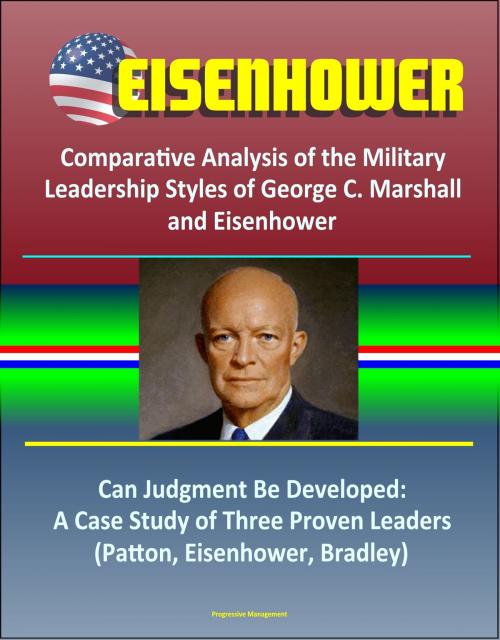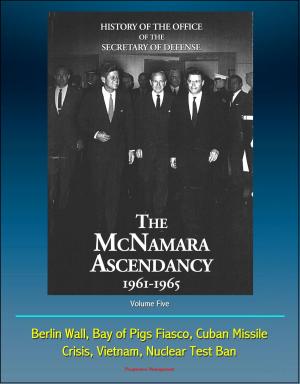Eisenhower: Comparative Analysis of the Military Leadership Styles of George C. Marshall and Eisenhower, Can Judgment Be Developed: A Case Study of Three Proven Leaders (Patton, Eisenhower, Bradley)
Nonfiction, History, Modern, 20th Century, Military, World War II| Author: | Progressive Management | ISBN: | 9781370694310 |
| Publisher: | Progressive Management | Publication: | March 17, 2017 |
| Imprint: | Smashwords Edition | Language: | English |
| Author: | Progressive Management |
| ISBN: | 9781370694310 |
| Publisher: | Progressive Management |
| Publication: | March 17, 2017 |
| Imprint: | Smashwords Edition |
| Language: | English |
These reports have been professionally converted for accurate flowing-text e-book format reproduction. Two unique studies examine leadership and judgment of Eisenhower and his fellow generals: A Comparative Analysis of the Military Leadership Styles of George C. Marshall and Eisenhower, and Can Judgment Be Developed: A Case Study of Three Proven Leaders (Patton, Eisenhower, Bradley).
In a constantly changing world threatened by ever increasing terrorist acts, American interests both at home and abroad more frequently require protection provided by great military leaders. In order to produce military leaders who can successfully meet the challenges America faces, it is important to develop their leadership skills. The process of developing leadership skills, however, is not easy and it requires a prodigious amount of determination, time, planning, training, mentoring, and refinement. One way to help develop leaders is to show them examples of previously successful leaders, leaders such as George C. Marshall and Dwight D. "Ike" Eisenhower. Marshall and Eisenhower were two talented and exceptional leaders and are great examples of American military leadership. Their leadership styles were indispensable during World War II, and it is important for leaders today to examine why their leadership styles were so successful.
A review of the development of Generals Patton, Eisenhower, and Bradley provides a biography outlining the commonalities in their growth. Subsequently, existing judgment development models are analyzed for use in this study. The development of the synthesized general is overlaid on the judgment development models.
In addition to ascertaining that judgment can be developed, this thesis asserts that experience is paramount in the process. Further, only through understanding the environment in which a decision was made, repeated exposure to similar experiences, and appropriate feedback can an experience be appropriately stored and recalled later. Finally, this thesis projects a method to enhance judgment in both academic and organizational environments.
These reports have been professionally converted for accurate flowing-text e-book format reproduction. Two unique studies examine leadership and judgment of Eisenhower and his fellow generals: A Comparative Analysis of the Military Leadership Styles of George C. Marshall and Eisenhower, and Can Judgment Be Developed: A Case Study of Three Proven Leaders (Patton, Eisenhower, Bradley).
In a constantly changing world threatened by ever increasing terrorist acts, American interests both at home and abroad more frequently require protection provided by great military leaders. In order to produce military leaders who can successfully meet the challenges America faces, it is important to develop their leadership skills. The process of developing leadership skills, however, is not easy and it requires a prodigious amount of determination, time, planning, training, mentoring, and refinement. One way to help develop leaders is to show them examples of previously successful leaders, leaders such as George C. Marshall and Dwight D. "Ike" Eisenhower. Marshall and Eisenhower were two talented and exceptional leaders and are great examples of American military leadership. Their leadership styles were indispensable during World War II, and it is important for leaders today to examine why their leadership styles were so successful.
A review of the development of Generals Patton, Eisenhower, and Bradley provides a biography outlining the commonalities in their growth. Subsequently, existing judgment development models are analyzed for use in this study. The development of the synthesized general is overlaid on the judgment development models.
In addition to ascertaining that judgment can be developed, this thesis asserts that experience is paramount in the process. Further, only through understanding the environment in which a decision was made, repeated exposure to similar experiences, and appropriate feedback can an experience be appropriately stored and recalled later. Finally, this thesis projects a method to enhance judgment in both academic and organizational environments.















